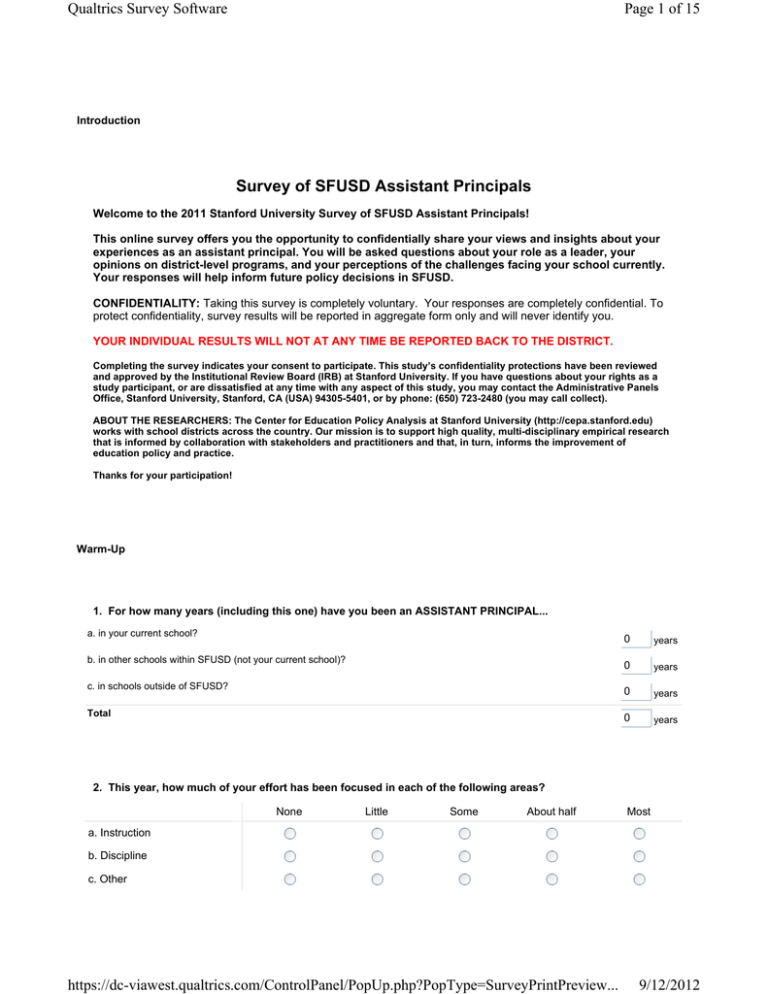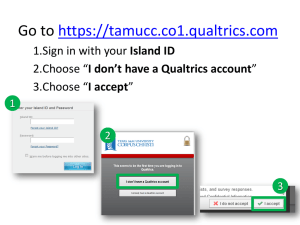
Qualtrics Survey Software
Page 1 of 15
Introduction
Survey of SFUSD Assistant Principals
Welcome to the 2011 Stanford University Survey of SFUSD Assistant Principals!
This online survey offers you the opportunity to confidentially share your views and insights about your
experiences as an assistant principal. You will be asked questions about your role as a leader, your
opinions on district-level programs, and your perceptions of the challenges facing your school currently.
Your responses will help inform future policy decisions in SFUSD.
CONFIDENTIALITY: Taking this survey is completely voluntary. Your responses are completely confidential. To
protect confidentiality, survey results will be reported in aggregate form only and will never identify you.
YOUR INDIVIDUAL RESULTS WILL NOT AT ANY TIME BE REPORTED BACK TO THE DISTRICT.
Completing the survey indicates your consent to participate. This study’s confidentiality protections have been reviewed
and approved by the Institutional Review Board (IRB) at Stanford University. If you have questions about your rights as a
study participant, or are dissatisfied at any time with any aspect of this study, you may contact the Administrative Panels
Office, Stanford University, Stanford, CA (USA) 94305-5401, or by phone: (650) 723-2480 (you may call collect).
ABOUT THE RESEARCHERS: The Center for Education Policy Analysis at Stanford University (http://cepa.stanford.edu)
works with school districts across the country. Our mission is to support high quality, multi-disciplinary empirical research
that is informed by collaboration with stakeholders and practitioners and that, in turn, informs the improvement of
education policy and practice.
Thanks for your participation!
Warm-Up
1. For how many years (including this one) have you been an ASSISTANT PRINCIPAL...
a. in your current school?
b. in other schools within SFUSD (not your current school)?
c. in schools outside of SFUSD?
Total
0
years
0
years
0
years
0
years
2. This year, how much of your effort has been focused in each of the following areas?
None
Little
Some
About half
Most
a. Instruction
b. Discipline
c. Other
https://dc-viawest.qualtrics.com/ControlPanel/PopUp.php?PopType=SurveyPrintPreview...
9/12/2012
Qualtrics Survey Software
Page 2 of 15
3. During all of your years as an Assistant Principal, how much of your effort has been focused in each of the
following areas?
None
Little
Some
About half
Most
a. Instruction
b. Discipline
c. Other
4. For how many years were you a TEACHER ...
a. in your current school?
0
years
0
years
0
years
0
years
12
Post
HighSchool
b. in other schools within SFUSD (not your current school)?
c. in schools outside of SFUSD?
Total
5. In which of these grades have you had TEACHING experience? (Check all that apply.)
Pre-K
K
1
2
3
4
5
6
7
8
9
10
11
Task Effectiveness of Self
Your School's Leadership
We are interested in what you and your principal do as school leaders.
6. How EFFECTIVE do you consider YOURSELF to be in the following leadership tasks?
Ineffective
A Little
Effective
Effective
Very
Effective
Using data for school improvement
Dismissing low-performing teachers
Finding the best teachers for my school
Filling teaching slots in my school
Getting the community involved in the school
https://dc-viawest.qualtrics.com/ControlPanel/PopUp.php?PopType=SurveyPrintPreview...
9/12/2012
Qualtrics Survey Software
Page 3 of 15
Experimenting with new instructional approaches
Getting teachers the professional development they need
Getting school staff to work together
Retaining Teachers
Managing student discipline
Exercising control over the budget
Communicating with the district administration
Getting parents involved in the school
Maintaining a safe environment in the school
Offering students high-quality instruction
Offering students supplemental services
Maintaining school facilities
Exercising control over the instructional program
Task Effectiveness of Principal
7. How EFFECTIVE do you consider YOUR PRINCIPAL to be in the following leadership tasks?
Ineffective
A Little
Effective
Effective
Very
Effective
Retaining Teachers
Offering students high-quality instruction
Getting teachers the professional development they need
Getting the community involved in the school
Experimenting with new instructional approaches
Exercising control over the instructional program
Filling teaching slots in my school
Getting school staff to work together
Getting parents involved in the school
Offering students supplemental services
Managing student discipline
Maintaining school facilities
Communicating with the district administration
Finding the best teachers for my school
Using data for school improvement
Maintaining a safe environment in the school
https://dc-viawest.qualtrics.com/ControlPanel/PopUp.php?PopType=SurveyPrintPreview...
9/12/2012
Qualtrics Survey Software
Page 4 of 15
Exercising control over the budget
Dismissing low-performing teachers
8. Please think carefully about how frequently each statement fits YOUR PRINCIPAL.
(Note: The word "others" may mean teachers, staff or other leaders at your school.)
Based on the Multifactor Leadership Questionnaire © 1995 by Bernard Bass and Bruce Avolio. All rights reserved. Mind
Garden, Inc. (www.mindgarden.com)
Not at
All
Once in
a While Sometimes
Fairly
Often
Frequently
or Always
He or she directs his or her attention toward failures to meet
standards.
He or she delays responding to urgent questions.
He or she goes beyond self-interest for the good of the group.
He or she waits for things to go wrong before taking action.
He or she heightens others' desire to succeed.
He or she gets involved immediately when issues arise.
He or she suggests new ways of looking at how to complete
assignments.
He or she gets others to look at problems from many different
angles.
He or she intervenes before problems become serious.
He or she re-examines assumptions to question whether they
are appropriate.
He or she specifies the importance of having a strong sense of
purpose.
He or she demonstrates that problems must become chronic
before I take action.
He or she considers an individual as having different needs,
abilities, and aspirations from others.
He or she considers the moral and ethical consequences of
decisions.
He or she articulates a compelling vision of the future.
He or she gets others to do more than they expected to do.
He or she is effective in meeting others' job-related needs.
He or she is effective in representing others to higher authority
(e.g., the district office).
He or she treats others as individuals rather than just as a
member of a group.
He or she uses methods of leadership that are satisfying.
He or she talks enthusiastically about what needs to be
accomplished.
He or she leads a group that is effective.
He or she acts in ways that build others' respect for me.
https://dc-viawest.qualtrics.com/ControlPanel/PopUp.php?PopType=SurveyPrintPreview...
9/12/2012
Qualtrics Survey Software
Page 5 of 15
He or she expresses satisfaction when others meet
expectations.
He or she is effective in meeting organizational requirements.
He or she is absent when needed.
He or she works with others in a satisfactory way.
He or she expresses confidence that goals will be achieved.
He or she talks about his or her most important values and
beliefs.
He or she talks optimistically about the future.
He or she shows that he or she is a firm believer in "If it ain't
broke, don't fix it."
He or she seeks differing perspectives when solving problems.
He or she concentrates his or her full attention on dealing with
mistakes, complaints, and failures.
He or she emphasizes the importance of having a collective
sense of mission.
He or she makes clear what one can expect to receive when
performance goals are achieved.
He or she displays a sense of authority and confidence.
He or she discusses in specific terms who is responsible for
achieving performance targets.
He or she helps others to develop their strengths.
He or she focuses attention on irregularities, mistakes,
exceptions, and deviations from standards.
He or she provides others with assistance when they show
effort.
He or she avoids making decisions.
He or she instills pride in others for being associated with me.
He or she keeps track of all mistakes.
He or she spends time teaching and coaching others (not
including students).
He or she increases others' willingness to try harder.
Now please consider your schools full leadership team. All of your responses are completely confidential.
These names will not be shared with the district but used only to get a sense of the size and characteristics of
leadership teams across schools in the district.
9. Who do you consider the primary members of your school's leadership team (please list their names)?
.
.
.
.
.
https://dc-viawest.qualtrics.com/ControlPanel/PopUp.php?PopType=SurveyPrintPreview...
9/12/2012
Qualtrics Survey Software
Page 6 of 15
.
.
10. What do you consider the strengths of this team?
11. In what areas do you think it is most important for this team to improve?
Instruction
Instruction
We are interested in your school's instructional practices and approaches to improvement.
12. Who in your school is responsible for observing the instruction of individual teachers and giving
feedback? (Mark all that apply.)
Myself
The Principal
Other Assistant Principal(s)
Department Chairs
Grade/Subject Lead Teachers
An Instructional Coach
Other (please specify):
https://dc-viawest.qualtrics.com/ControlPanel/PopUp.php?PopType=SurveyPrintPreview...
9/12/2012
Qualtrics Survey Software
Page 7 of 15
13. Who in your school is responsible for initiating and coordinating the progress of specific instructional
improvement activities? (Mark all that apply.)
Myself
The Principal
Other Assistant Principal(s)
Department Chairs
Grade/Subject Lead Teachers
An Instructional Coach
Other (please specify):
14. Who in your school is responsible for examining and discussing data on students’ academic performance?
(Mark all that apply.)
Myself
The Principal
Other Assistant Principal(s)
Department Chairs
Grade/Subject Lead Teachers
An Instructional Coach
Other (please specify):
15. How often do you meet with your team of instructional leaders as a group? (Check only one.)
We don't meet as a group
Once or twice per year
Quarterly
Monthly
About every two weeks
Weekly or more
N/A - My school does not have a team of instructional leaders.
16. How frequently do TEACHERS IN YOUR SCHOOL review assessment data (e.g., department-wide common
assessments, standardized tests)?
Never
A Few
Times a
Year
Every 6 to Every 3 to
8 Weeks
5 Weeks
https://dc-viawest.qualtrics.com/ControlPanel/PopUp.php?PopType=SurveyPrintPreview...
Weekly
9/12/2012
Qualtrics Survey Software
Page 8 of 15
a. Independently
b. With teachers in their grade level
c. With teachers across grade levels
d. With you
e. With someone from the central office
17. How frequently do YOU review assessment data (e.g., department-wide common assessments,
standardized tests)?
Never
A Few
Times a
Year
Every 6 to Every 3 to
8 Weeks
5 Weeks
Weekly
a. Independently
b. With other members of your leadership team
c. With a group of teachers
d. With individual teachers
e. With someone from the central office
18. Of the following sources of information, what do you rely on the MOST and SECOND MOST to find out
about teachers’ instructional practices? (Check only one in each column.)
SECOND MOST (Check MOST (Check only ONE
only ONE in this column.)
in this column.)
Unscheduled classroom walk-throughs
Targeted observations of specific teachers
Discussions with teacher about what happens in the classroom
Monitoring student performance data
Reviewing student work
Reports from other school leaders (e.g., AP, coach, teacher
mentor)
Reports from students
Reports from parents
Reports from other teachers
Formal evaluation process
19. For how many students have you done the following this school year?
None
<10
10-20
21-30
31-40
>40
Students Students Students Students Students
a. Visited the student's home
https://dc-viawest.qualtrics.com/ControlPanel/PopUp.php?PopType=SurveyPrintPreview...
9/12/2012
Qualtrics Survey Software
Page 9 of 15
b. When a student performed poorly, you informed
his/her parents
c. When a student performed poorly, you talked
with his/her parents about ways they could help
their child learn
b. When a student performed better than usual, you
informed his/her parents
Support
Supports
This section asks about the supports you have to help you in your job
20. Thinking about the PROFESSIONAL DEVELOPMENT activities you participated in over the last 12 months,
how USEFUL did you find the following to improving your effectiveness as an assistant principal?
Very
Useful
Useful
A Little
Useful
Not
Useful
N/A - Did
not
participate
in this
type of
PD
University course(s) related to your role as principal that were
NOT part of a formal degree program
University course(s) related to your role as principal that were
part of a formal degree program
Attending stand-alone workshops related to specific aspects of
your job as principal
Working WITH a mentor/coach as part of a formal
arrangement that is recognized or supported by your school
district
Attending conferences
Participating in a principal network (e.g., a group of principals
organized by an outside agency or through the Internet)
Attending a training series related to specific aspects of your
job as a principal
Working AS a mentor/coach to another principal as part of a
formal arrangement that is recognized or supported by your
school district
Visits to other schools designed to improve your own work as
principal
21. Please describe the degree of support you receive from SFUSD Central Office in the following areas:
https://dc-viawest.qualtrics.com/ControlPanel/PopUp.php?PopType=SurveyPrintPreview...
9/12/2012
Qualtrics Survey Software
Page 10 of 15
None,
but I do
not
require
this
support
None,
but I
would
like this
support
A little
support
Some
support
A lot of
support
Selecting professional development for your staff
Fundraising
Encouraging parent involvement
Building a culture of achievement
Providing academic and social support for students
Managing school budgets
Managing school operations
Improving instruction
Improving college counseling
Long-range strategic planning
Building a leadership team within your school
Human resource issues (hiring, removing, or training
teachers)
Other (please specify):
Challenges to School Improvement
Challenges to School Improvement
22. Below are several factors that could be considered “roadblocks” for schools. Please indicate the extent to
which each of the following was a factor in hindering your school's improvement during the 2010-2011 school
year:
Not a
Factor
Somewhat of a
Factor
A Factor
A Serious
Factor
Teachers lack knowledge and skills
Teachers do not put forth enough effort
Social problems in the school’s community (e.g.,
poverty, gangs)
Pressure to obtain external funds
Central office expectations unclear
Racial/ethnic tensions in the school’s community
Students come to school unprepared to learn
https://dc-viawest.qualtrics.com/ControlPanel/PopUp.php?PopType=SurveyPrintPreview...
9/12/2012
Qualtrics Survey Software
Page 11 of 15
Pressure to reduce school expenditures
Pressure to get test scores up quickly
Parents apathetic about their children
Pressure to constantly adapt new programs
Mistrust between teachers and parents
Lack of support from the school’s community
Negative stereotypes about the schools community
Difficulty hiring effective teachers
Pressure to comply with state and federal regulations
Teacher turnover
Students apathetic about school
Lack of support from central office
Poor relationship between school and central office
leadership
Difficulty removing ineffective teachers
Other (please specify):
23. Among the factors you chose in the last question, which does your current school need to address the
MOST in order to improve?
» Pressure to constantly adapt new programs
» Pressure to get test scores up quickly
» Pressure to obtain external funds
» Pressure to reduce school expenditures
» Pressure to comply with state and federal regulations
» Teachers lack knowledge and skills
» Teachers do not put forth enough effort
» Teacher turnover
» Difficulty hiring effective teachers
» Difficulty removing ineffective teachers
» Lack of support from central office
» Central office expectations unclear
» Poor relationship between school and central office leadership
» Lack of support from the school’s community
» Social problems in the school’s community (e.g., poverty, gangs)
» Racial/ethnic tensions in the school’s community
» Negative stereotypes about the schools community
https://dc-viawest.qualtrics.com/ControlPanel/PopUp.php?PopType=SurveyPrintPreview...
9/12/2012
Qualtrics Survey Software
Page 12 of 15
» Mistrust between teachers and parents
» Parents apathetic about their children
» Students come to school unprepared to learn
» Students apathetic about school
» Other (please specify):
Education and Administrative Credential Program
About You
This is the final section of the survey. We are interested in finding out about you personally - specifically:
your educational background, whom you turn to for support, how satisfied you feel, and your future plans.
24. Describe your educational background.
(Note: If you have more than one of each of these degrees, please describe your MOST RECENT in each area.)
Name of College/University
Year Degree
Conferred
Major
(YYYY)
a.
Undergraduate
Degree
b. Masters
Degree
c. Other
Graduate
Degree
25. Have you completed or are you completing an administration credentialing program?
Yes, I have completed an administrative credentialing program (please specify where):
Yes, I am in the process of completing an administrative credentialing program (please specify where):
No, but I plan to start an administrative credentialing program in the future.
No, and I do not plan on ever enrolling in an administrative credentialing program.
https://dc-viawest.qualtrics.com/ControlPanel/PopUp.php?PopType=SurveyPrintPreview...
9/12/2012
Qualtrics Survey Software
Page 13 of 15
26. In your administrative credentialing program, how much opportunity did/do you have to learn the SKILLS
AND KNOWLEDGE specifically related to the following areas?
None
Spent
Some Time Explored in
Some
Touched on Discussing
Extensive
or Doing
Depth
it Briefly
Opportunity
Leadership or leadership development
Fundraising
Hiring staff
Legal issues in education
Managing personnel
Budgeting and finance
Educating for democracy or democratic values
Removing/counseling out staff
Multiculturalism or diversity
Evaluating teachers
Leading classroom instruction
Designing a curriculum
Analyzing and using quantitative data
Handling interpersonal issues among staff
Creating a safe school environment
Handling student discipline
Working with parents and community members
The history of education
What I use on a day-to-day basis in my job as an
assistant principal
Working with the teachers' union
Satisfaction and Future Plans
27. To what extent are you generally SATISFIED with each of the following?
Very
Dissatisfied
Dissatisfied
Satisfied
Very
Satisfied
a. Being an assistant principal
b. Being an assistant principal at your current school
c. Your performance as an assistant principal at your
current school
https://dc-viawest.qualtrics.com/ControlPanel/PopUp.php?PopType=SurveyPrintPreview...
9/12/2012
Qualtrics Survey Software
Page 14 of 15
28. Please think back to when you were a teacher. To what extent were you generally SATISFIED with each of
the following?
Very
Dissatisfied
Dissatisfied
Very
Satisfied
Satisfied
a. Being a teacher
b. Your performance as a teacher
29. How likely is it that you will do the following at some point in your FUTURE career?
Very
Unlikely Unlikely
Likely
Very
Likely
a. Be a school principal (or equivalent)
b. Work as a classroom teacher
c. Work in a school in another role (e.g., curriculum specialist, instructional
coach, counselor)
d. Work in the district office
e. Work in education, outside of K-12 schools (e.g., educational entrepeneur,
researcher, professor)
f. Leave education temporarily (e.g., sabbatical, child-rearing)
g. Pursue a career outside of education
h. Stay in education but not in SFUSD
i. Remain an assistant principal until I retire
Preferences
30. If you could work at ANY SCHOOL IN THE DISTRICT other than the one you are currently in, what would be
your top three choices (in order of preference)?
First Choice School:
Second Choice School:
Third Choice School:
31. Consider your FIRST choice school (not including your own) and describe what about that school is
particularly appealing to you.
https://dc-viawest.qualtrics.com/ControlPanel/PopUp.php?PopType=SurveyPrintPreview...
9/12/2012
Qualtrics Survey Software
Page 15 of 15
32. Is there another district that you would prefer to work in?
Yes (please specify):
No
https://dc-viawest.qualtrics.com/ControlPanel/PopUp.php?PopType=SurveyPrintPreview...
9/12/2012




